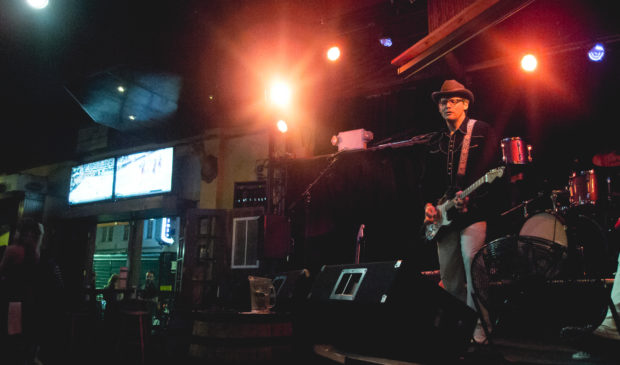About the Author
Chad Swiatecki is a 20-year journalist who relocated to Austin from his home state of Michigan in 2008. He most enjoys covering the intersection of arts, business and local/state politics. He has written for Rolling Stone, Spin, New York Daily News, Texas Monthly, Austin American-Statesman and many other regional and national outlets.
Newsletter Signup
The Austin Monitor thanks its sponsors. Become one.
Most Popular Stories
- Office slowdown sparks new downtown housing ambitions
- Parks Board recommends vendor for Zilker Café, while voicing concerns about lack of local presence
- City leaders evaluate surprising ideas for water conservation
- Audit: Economic official granted arts, music funding against city code
- Downtown Historic Resource Survey eyes seven new districts eligible for designation
-
Discover News By District
Popular Whispers
Sorry. No data so far.

Local developers hear call for creative space partnerships through cultural trust
Tuesday, February 1, 2022 by Chad Swiatecki
As the city’s recently activated Economic Development Corporation takes its first significant steps to preserve creative spaces, the local real estate and development community is starting to explore ways to partner and bring arts and music uses into new and existing projects.
While there were no specific details of the discussions taking place behind the scenes about how real estate leaders could become more involved in the effort to preserve arts space, January’s Urban Land Institute Austin breakfast panel looked closely at how the EDC plans to manage the city’s long-discussed cultural trust.
Anne Gatling-Haynes, the chief transaction officer for the EDC, said she’s been engaged in several informal talks with local developers interested in the trust. At the same time, she is moving ahead with the request for proposals from local arts organizations seeking preservation help. That process is expected to help identify some of the needs faced by the creative community that is being forced out of the city by rising real estate prices.
While the trust has $16.9 million in city funds to deploy toward property acquisitions, Gatling-Haynes told the audience of real estate and planning professionals that the city’s money can’t be used as gap financing for prospective projects, but could help to secure space in completed structures.
“Having learned lessons in other cities in how culture, arts and music can be incorporated into larger development schemes, what are the practical realities as well as the funding schemes that need to happen,” she said.
The EDC is another long-discussed development tool that has the flexibility to operate more like a private entity and take on partnerships, while serving public priorities around creative spaces and addressing affordability and equity issues. Its first pool of funding came from a 2018 bond proposal that allocated $12 million, as well as additional money from the city budget dedicated to music and arts spaces.
With the city’s real estate prices rising faster than almost any other market in the country, clusters of arts spaces and music venues have disappeared in recent years. That loss was no surprise to panelist John Riedie, who recalled the forecast made by a Minneapolis nonprofit nearly a decade ago that there was “a coming massacre of creative space” in Austin due to real estate pressures.
“The goal and conversation remains, let’s not become San Francisco where the arts and culture got pushed out and it was only affordable to certain people. It became a bifurcated society of the very poor and the very wealthy, and we don’t want to see that here because musicians want to be in that middle ground and are economic drivers,” he said. “Unless we want to be a monocultural economy and society we need to make sure that artists and musicians can live here and work here, and the key to that is affordable space.”
Austin’s EDC and cultural trust model seeks to mimic the results seen at specific projects and programs launched in Brooklyn, the San Francisco Bay Area and Pittsburgh over the past 20 years that focused on establishing or securing arts space as part of larger communities.
Katie Dixon, former CEO of Powerhouse Arts in Brooklyn, said Austin’s early attempt at assisting arts and music groups is distinct because it is starting with public money aimed at equity goals. To be successful, she said, the local real estate economy will need to try some new approaches to deal-making and be willing to get to know the creative sector well.
She explained that arts development in Brooklyn succeeded “because of the strong arts community who demanded to be at the center of the conversation. That’s critical and it certainly doesn’t happen unless you center the voices of artists and arts leaders. Then you had a strong city entity willing to put the muscle behind getting it done and you have to have a real estate community that’s willing to experiment and try different models. What you’re doing with the trust is exactly the way to go.”
Photo by Paul Hudson from United Kingdom, CC BY 2.0, via Wikimedia Commons. This story has been changed since publication to correct a reference.
The Austin Monitor’s work is made possible by donations from the community. Though our reporting covers donors from time to time, we are careful to keep business and editorial efforts separate while maintaining transparency. A complete list of donors is available here, and our code of ethics is explained here.
You're a community leader
And we’re honored you look to us for serious, in-depth news. You know a strong community needs local and dedicated watchdog reporting. We’re here for you and that won’t change. Now will you take the powerful next step and support our nonprofit news organization?


